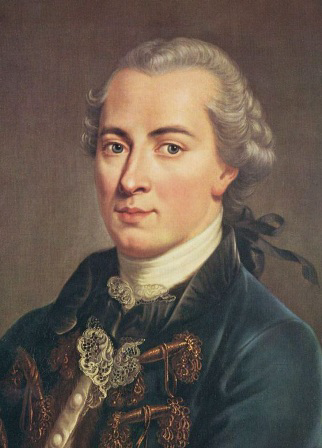
Immanuel Kant, 1724-1804, is among the most influential thinkers of modern times.
His work touches on most aspects of philosophy, from epistemology and metaphysics to ethics and philosophy of religion. Kant lived his entire life in Konigsberg, Prussia, in present day Kaliningrad. He studied at the Konigsberg university where he became a professor in 1770. The series of published works that were to leave a permanent impression on the history of philosophy began with Critique of Pure Reason in 1781.
In his epistemology, Kant divides all propositions into analytical and synthetic. An analytical proposition is a statement qualifying its object, derived solely from the object of analysis. A synthetic proposition is either empirical (a posteriori) or a priori. An empirical proposition is derived from sense experience. An a priori proposition has independent intrinsic validity and a certain number of such proposition, concepts and categories must be assumed to exist before thought or organization of empirical propositions becomes possible. A priori categories are for example quantity, as in one and many and modality as in possibility and necessity. Ideas of space and time are also a priori built into the human mind.
The world of sense experience is necessary to human thought but the objects thus sensed are not directly known. Das ding an sich. - The thing in itself, is unknowable, a part of the world of noumena. While objects in themselves are not directly known, man can still make useful inferences on them and perceive a shared reality with others. Kant’s metaphysical work is considered a bridge between empirism and rationalism.
Reasoning concerning issues such as free will leads to antinomies, where there exists a proof for the proposition and its negation. This observation is at the basis of dialectics, which were further developed by Hegel and later adopted as a basis for Marx’s philosophy of history and social theory.
Kant accepts the idea of free will as an intrinsic human property. The correct application of free will is man recognizing the laws of morals dictated by reason and voluntarily following these. If this were not voluntary, this could not be called an ethical action. Not any choice is free will. Free will occurs when one is the first cause of a chain of caused events, mere reacting is not viewed on a par with free will.
Kant is maybe best known for his categorical imperative, a formulation of the golden rule: Act so that you might wish the maxim of your actions to be a universal law. Kantian ethics place reason as the final source and arbiter of morals. An act which is done for expedience or only for the sake of habit or legality cannot be a truly moral act. According to Kant, a moral act must be a result of struggle, otherwise it is done for a reason other than a moral imperative. In this view we probably see a reflection of Kant’s formative years in a Lutheran pietist environment. The categorical imperative has been criticized because it may lead to absurd results when applied between people who have fundamentally different needs or desires.
Kant’s theological work critiques various proofs of the existence of God. Kant proposes that there cannot be a purely rational explanation for the existence of God but rather that one may glimpse the higher through observing man’s sometimes apparent impulses for ethical action and higher values. God is thus beyond the scope of empiria or pure reason. The argument that the structure of the cosmos bespeaks underlying intelligence Kant treats with respect but says that this at best proves the existence of a master engineer, not the existence of a supreme being.
From the esoteric point of view, Kant’s greatest failing may be his uniformitarian assumption concerning mankind. This is most expressed with his categorical imperative, which assumes the existence of a common, universal concept of good and desirable.
This concept in light of esoteric study is quite different for STO and STS, which may both view their actions in light of this precept. Also, the moral principles for Adamic and Pre-Adamic man would be experienced differently, even if the practical ethic might not always be different. The idea that moral virtue is necessarily a struggle is also problematical. As long as man does not possess a single I, one’s actions may always be considered as struggle between distinct influences. Still, it is oversimplification and overgeneralization to say that what is virtuous is always a struggle. This idea denies the possibility of voluntary reciprocal giving, synergy and joining which is at the core of the STO concept of interaction.
The categorical imperative may be seen as valid at a higher level, in the context of alignment with the thought center or archetype of service to others, even though it is problematical when applied to the whims and desires of the exterior man. Doing unto others as one wished all to do works well in the context of according free will and refusing negation of free will, in the context of giving all things their due or pursuing objective knowledge.
